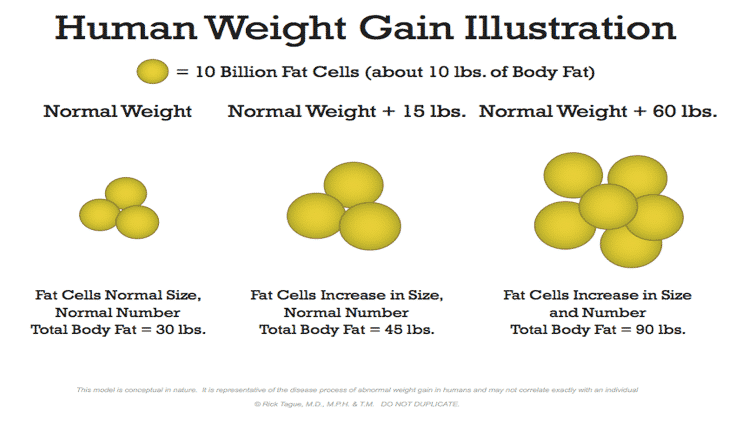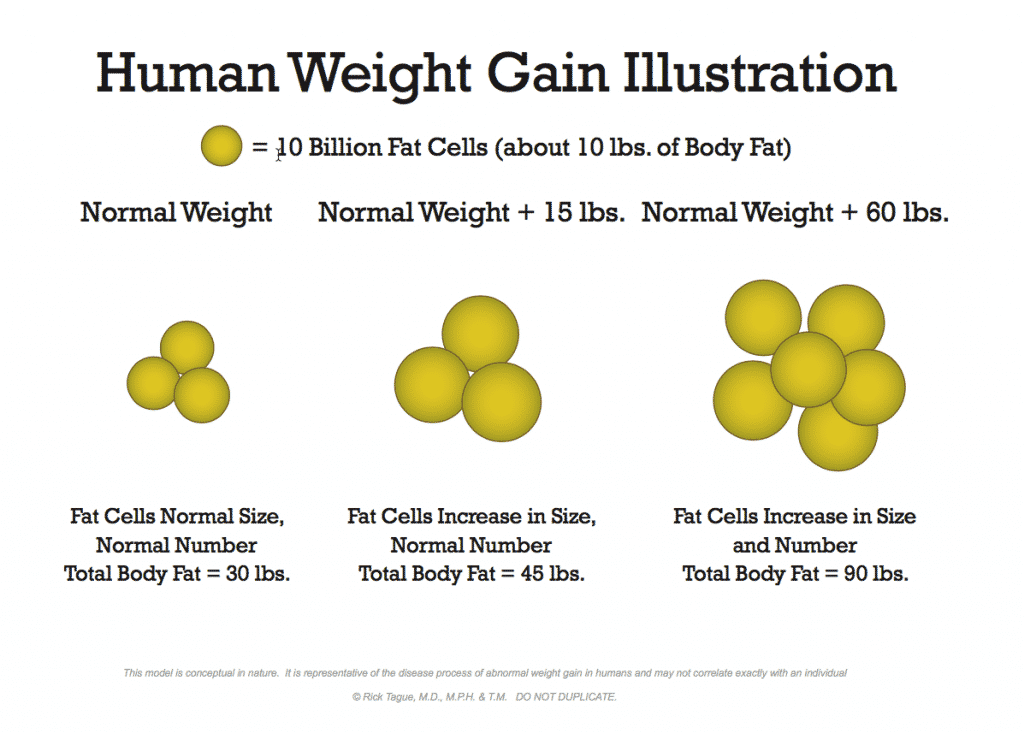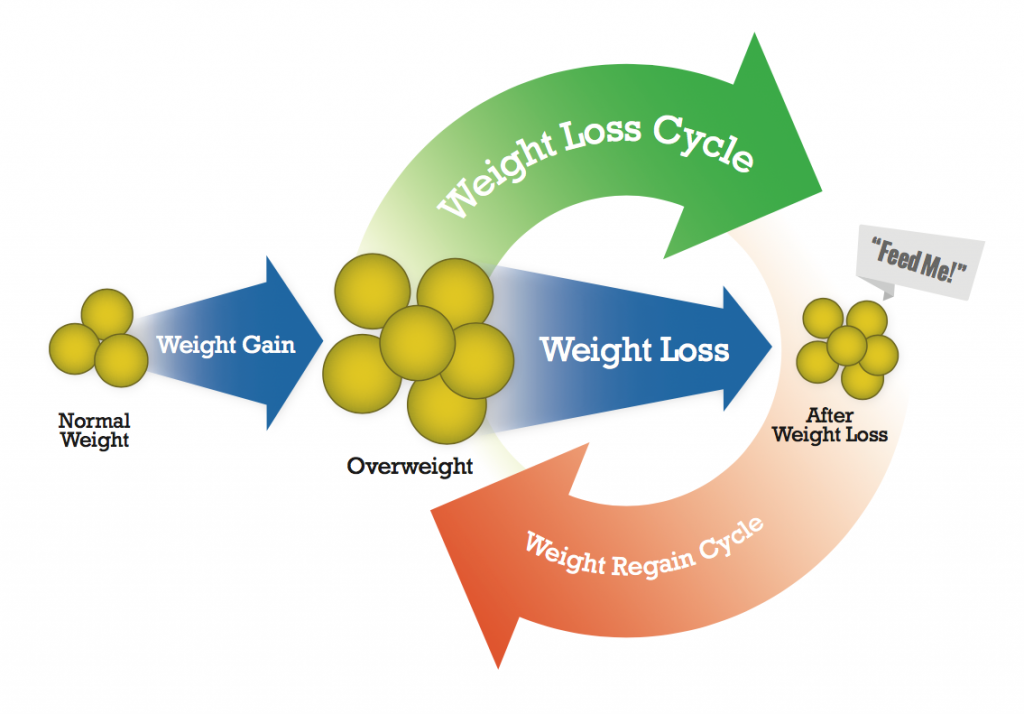
Our bodies are made of cells. Muscle cells make up muscles, brain cells make up our brain, and fat cells (known as adipocytes) make up fat. And the fact is, without ABNORMAL fat cells, unwanted weight gain cannot occur! Let me explain….
Imagine if something triggered your muscle cells to enlarge and multiply to the point that your muscles doubled, tripled, and then quadrupled in size! The added bulk would be a major bother. What if our skin cells started enlarging and multiplying to the point that our skin became baggy and was dragging around on the floor while walking? How bizarre!
Although those examples seem strange, the fact is, when people develop unwanted body fat, those same changes are taking place within fat tissue. Unfortunately, many people accept this disease process as “normal”.
If you are struggling with unwanted weight gain, controlling your fat cells is critical. The fat cell is the battleground for unwanted weight gain.
To understand successful weight loss, you must understand the fat cells and how they cause weight gain:
WEIGHT GAIN PHASE #1: First, fat cells grow bigger.
We are born with a certain number of fat cells. In times of “plenty”, fat cells store extra calories for future hard times. When needed, they will release stored fat calories to use as fuel.
The ability of fat cells to store excess calories as fat is based on their ability to expand like a balloon. Depending on how much fat is pushed into the fat cell, its size will change.

This photo is an electron microscope view of fat cells. Note: Fat cells are extremely small (about 66 mcg). 5 cells will fit on the head of a pin!
Fat cells can vary in size from 20% of capacity (small and starving!) to 100% of capacity (plump and stuffed!). The “normal and healthy” size would be around 66% of capacity.
Weight gain initially occurs when we overeat and fat cells increase from 66% capacity towards 100% capacity. But our original 30 billion fat cells, that normally contain a total of 30 lbs of body fat, can only hold an extra 15 lbs or so. If we keep gaining weight beyond that extra 15 lbs, Weight Gain Phase #2 MUST occur!
WEIGHT GAIN PHASE #2: After 15 lbs, fat cells multiply.
Our 30 billion fat cells can multiply up to 160+ billion if needed. Fat cells multiply during excessive weight gain (more than 15 lbs after age 21) or during rapid weight gain (more than a pound a week for several weeks). It is ideal to control body weight throughout life to prevent our fat cells from multiplying, but for most people, that is not reality.
In summary, fat cells initially expand (increase in size) to add 15 lbs of extra body fat. After 15 lbs of weight gain, fat cells multiply by turning stem cells (pre-adipocytes) in to fully functioning fat cells. Through multiplication, fat cells can potentially store an unlimited amount of extra body fat!

WEIGHT LOSS: “Honey, I’ve shrunk my fat cells!”
Consider what happens to our fat cells with weight loss:
Example 1: After gaining up to 15 extra pounds as an adult.
We can gain up to 15 lbs by enlarging our fat cells. That 15 lbs of weight gain is reversed with weight loss from dieting. With the weight loss, fat cells return to their normal size and normal status is again achieved.
This gradual 15 lb fluctuation, up or down from one’s normal weight is not a disease. It can even be seasonal and it is quite normal. It is how our body’s fat cells are designed to function. Weight loss in these individuals will decrease the size of the fat cells back to normal.
Research shows that as people lose weight, their fat cells shrink in size and fat content. This is great news! We have a method for weight control! And, if it has been just a few pounds of weight gain over time, it is not too difficult to lose the weight and keep it off.
Example 2: Adult weight gain of more than 15 lbs.
The only way to gain more than 15 pounds is for fat cells to multiply. And, if you have excess fat cells, you must reduce your fat cell size to smaller than normal to lose weight back to your original, age 21 weight! For example, if you have doubled the number of fat cells, you will need to shrink those cells to half of normal size to end up at normal weight.
The diagram below illustrates the increase in size and number of fat cells with weight gain and the reduction in size required to achieve normal weight. Note that at normal body weight, after dieting, the cells end up significantly smaller than the size of the original fat cells.
Since small fat cells are able to store more fat, they may expand back to their full capacity. This weight regain after dieting is referred to as “weight cycling” or “yo-yo dieting”.

FAT CELL LIFESPAN: Once created, always present!
Once fat cells multiply, those extra cells are part of the human body. Because they are “clones” of our original cells, our body cannot tell the difference between the original fat cells and newly created fat cells.
Once created, they stay with us. Research is now showing that even surgically removing fat cells with liposuction is not successful long term. The body senses that something is missing and, over time, will recreate the missing fat cells in some other part of the body.
This persistence of newly created fat cells to stay alive in the body explains why long term weight loss is such a challenge. It also gives us insight in to what is required to lose weight and maintain the loss over the long term.
Fat Cells Fighting Back With Hormones! “Feed me!”
Two hormones are particularly important when it comes to weight control long term.
Leptin is a “good guy” hormone. Leptin is made by our fat cells and boosts our metabolism and suppresses our appetite. More body fat means more leptin being produced. Every time we lose weight, the amount of leptin in our body decreases. Less leptin means our metabolism slows down and our appetite increases. This helps explain why dieters get tired and hungry!
Ghrelin is the “gremlin” of dieters. Ghrelin makes the stomach growl and it makes us hungry. Usually ghrelin increases at meal time, telling us its time to eat. Ghrelin also increases with weight loss, increasing about 30% after ~ 30 lbs of weight loss. That’s enough to make you feel like it is definitely time to eat after losing some weight!
Over time, these 2 hormones have proven more powerful than willpower, more powerful than self-control, and a true “dieter’s nightmare”! The influence of these hormones must be managed long term for weight loss and weight maintenance.
WEIGHT LOSS MAINTENANCE: Fat cell control long term.
Maintaining control of your fat cells is mandatory for long term weight loss. The main error when it comes to weight loss is to underestimate the difficulty of fat cell control long term. There are three keys to keeping weight off over time:
- 1) Prevent further fat cell multiplication by NEVER gaining past your lifetime maximum weight!
- 2) Lose weight with a medically sound approach to achieve a medically determined “best weight” for you. You will be shrinking your fat cells, using that extra fat as fuel. Remember, this means NOT losing weight with unhealthy fad or rapid weight loss diets that can cause excessive loss of muscle and bone, damaging long term health and metabolism.
- 3) Use powerful, medically proven weight maintenance strategies to KEEP the fat cells controlled long term. Remember, leptin and ghrelin are powerful, so powerful strategies are required! This means using a personalized, comprehensive approach to controlling your weight. Your appetite tendencies, your metabolism, and your nutritional needs are unique to you.
Appetite, metabolism, and nutrition must all be managed long term to stay in control of fat cell size (to keep them small) and number (to keep them from multiplying).
SUMMARY:
Over the years, I have assisted thousands of successful individuals in “managing” their weight long term. I believe that you can also experience success. You have the motivation necessary and you have proper goals or you would not be reading this! To be successful, you will need to use powerful and effective strategies to manage leptin and ghrelin influences as they try to sabotage you!
To be clear, I strongly believe that your appetite and metabolism MUST be managed with powerful, science-based, medically sound approaches to achieve lasting weight loss success. You see, there really is no other way. Your internal appetite and metabolism tendencies will control your weight over the long term, unless they are successfully managed.
If you are overweight, we can help you on your journey to weight loss success. Let our experience with over 20,000 patients go to work for your benefit. Remember, achieving a healthy weight is necessary for Optimum Health, which is always worth the effort.
For Optimum Health,
Rick R. Tague, M.D., M.P.H. & T.M.
